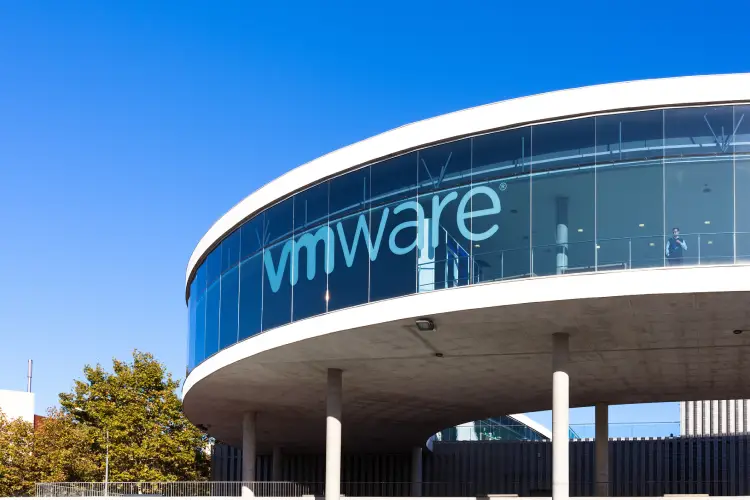
VMware confirmed its split from parent company Dell on Monday, creating an independent business with a value of $64bn. The virtualisation specialist’s new-found freedom will allow it to double down on its push to offer more multi-cloud and software-as-a-service (SaaS) packages to customers, and could see it move to offering 5G and edge computing services, too.

The decoupling, first announced in April and completed after the close of the New York Stock Exchange on Monday, has seen Dell sell its 81% share in publicly traded VMware, which it acquired in 2016 as part of a deal for VMware’s then-parent company EMC. Shareholders received a special dividend totalling $12bn as a result of the move, the majority of which will go to Dell and reportedly help it pay off some existing debts.
Stating he is “bullish” about the company’s future, VMware CEO Raghu Raghuram said: “As a standalone company, we now have the flexibility to partner even more deeply with all cloud and on-premises infrastructure companies to create a better foundation that drives results for our customers.”
The future of VMware: multi-cloud and SaaS
An early pioneer of virtualisation, VMware has more recently made a successful transition into the cloud market by offering a range of products which allow users to migrate workloads to the cloud and manage multiple cloud deployments in one place. With customers continuing to flock to the cloud in greater numbers, this is set to be a focus of the company’s strategy in the years to come.
As well as the split from Dell, VMware has been undergoing some major changes at management level, with Raghuram being appointed in May to succeed previous CEO Pat Gelsinger, who left the company in January to take the top job at chipmaker Intel. More recently, a new CTO, Kit Colbert, took up his post last month, and both the new executives have been vocal in their desire for VMware to support multi-cloud deployments and persuade more customers to adopt its SaaS offerings.
In the second quarter of 2021, VMware’s SaaS revenues of $776m eclipsed traditional subscriptions ($738m). And speaking at the company’s VMworld event last month, Colbert said SaaS makes the customer experience “so much richer for them [because] they can see that value and realise that value so much quicker.” For a company like VMware, which grew its revenues on a traditional software licensing model, the change to SaaS has not been easy, he added, saying: “We understand it very well now, but it is such a fundamental mindset shift for so many folks.”
The split from Dell is likely to allow VMware to accelerate this transition, says Bola Rotibi, research director for software development at CCS Insight. “Their direction is fairly well set in that they want everything to be subscription-based,” she says. “They’ll still do perpetual licenses too, but the shift towards subscriptions is set in stone across the industry and VMware is reacting to that.”
While other companies which made their name providing on-premise services, such as IBM, have struggled to grow cloud revenues, Rotibi believes VMware’s strong position in the market means it is well-placed for the changes ahead. The company already has a tie-up with AWS, VMware Cloud on AWS, which helps customers migrate their on-premise VMware deployments to the cloud, and it could strike more partnerships with third parties now the influence of Dell is no longer a factor.
“VMware is like a universal connector, and the consistent deployment platform it is seeking to offer across multiple clouds and on-premise environments supports the notion it wants to be the ‘Switzerland’ of cloud management,” says Rotibi. “If anything the spin-off from Dell will allow it to stay focused on this without having to be in line with the direction of a bigger parent company.”
In future, this management of services could extend to edge computing and 5G networks, Rotibi believes. The company already offers a “Telco cloud” for telecoms providers, and earlier this year secured a contract with US operator Dish, which uses its software to run some of the infrastructure of its 5G network. Rotibi says this could be just the tip of the iceberg when it comes to VMware’s activities in the sector. “The management of edge computing and 5G is an area where there’s a lot of movement in the industry, and could be an interesting environment for them,” she says.
VMware Dell split: will enterprise customers notice any changes?
In the short-term, users of VMware’s products are unlikely to notice any big changes, says Steven Schuchart, principal analyst for enterprise networking at GlobalData. “Any real changes we see from the spin-out of VMware will take some time, as VMware gets used to its new footing as an independent company and its CEO and other new executives that have come on board since Pat Gelsinger left get comfortable in their roles,” Schuchart says, adding: “Enterprise buyers shouldn’t experience any earth-shaking changes to VMware’s long-term technology strategy. At most, they will see options from new or renewed deals with other vendors over time.”






